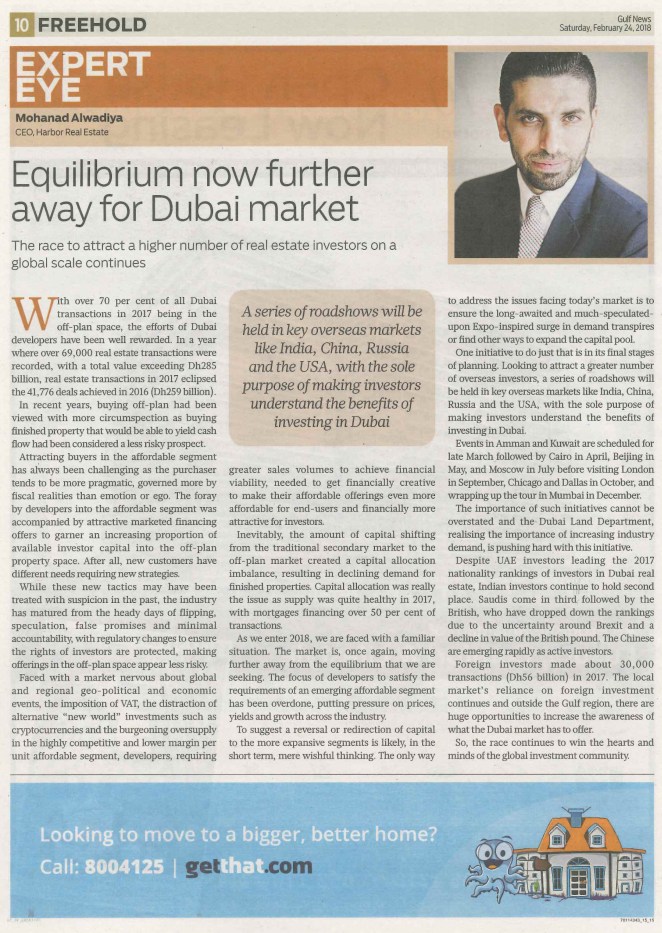Should I assign my property to a leasing broker or a property manager?
You enter into a leasing agreement when you wish your real estate agency to locate suitable tenants for your apartments and facilitate the signing of the tenancy agreement, leaving you to assume the responsibility of managing the tenants and all aspects of the property thereafter. A property management agreement includes more. It provides an assessment, strategy and activity plan designed to harness the financial potential of your property. Considerations include history; current market, economic and risk factors; regulations; finance; and market dynamics. An activity plan covers pricing and marketing, customer relationship and tenant management, and policy and cost management. These will be performed under a property management agreement. A good property manager will make your investment work harder for you and the returns you receive will outweigh any fees.
I wish to sell my villa, but the garden needs a little bit of work. Is it worth investing in improving the garden? Am I likely to get my money back?
For your garden to become a selling point, you need to establish a low-maintenance and functional landscape that is highly appealing to the potential buyer. Resist the temptation to clutter the landscape with every species of flora known to man. Plants grow and you need to keep that growth in check as your garden can look unkempt and create a negative impression. Ensure that all landscaping elements must be coordinated carefully. If you don’t know or understand the differing qualities of certain soils, it’s time to call your landscape gardener and have him produce an impressive garden for you. Even if you don’t plan on selling your home for another five or 10 years, now is a good time to lay the foundation for a great landscape design that will win over your future homebuyers.
I am planning to invest in Dubai. As this would be my first investment, can you give any useful tips.
First of all, know why you want to invest in property. You must have a clear understanding of what you are trying to achieve. Then you must set your financial objectives carefully. Success in property investment can only be attained when (and if) those objectives have been realised. Always think long term for your greatest success. Those who have had the greatest success possess the ability to think long term, make rational, well-researched and carefully thought-out decisions with the end objectives in mind and understand that every real estate industry globally will go through cycles of growth and contraction. Make sure you know your stuff by being able to communicate knowledgeably with the experts. Always strive to eliminate risks. Plan your finances, cash flows, capital requirements and debt levels carefully.
With many new projects and off-plan opportunities, I am nervous about the quality of end products. Can we expect an improvement in quality?
During the global financial crisis, many developers realised that properties of poor quality were dealt the harshest of value declines. As a result, many developers did not survive. Having said that, the old caveat of “buyer beware” still applies. Deal with a reputable developer. Ask around or seek professional guidance. Ask what proactive measures are taken to ensure the end product has been built to an acceptable standard. Warranties and any quality assurance policies should be discussed in detail, and have the sales and purchase agreement reviewed by a professional. Engage an expert to inspect (snag) your property and report any legitimate issues to the developer for rectification. Remember, once you have taken ownership of the apartment, the developer is still obliged to fix any issues that may arise during the full 12 months following the transfer of ownership.
Question of the Week
I am buying an off-plan property. Can you explain the principle of escrow.
An escrow can be described as a legally recognised financial instrument held by a third party (typically a bank) on behalf of two other parties (typically a buyer and a seller) who have agreed to conduct a particular transaction in accordance with certain conditions. Funds are provided by the buyer and held by the party (bank) providing the escrow service until it receives the formal advice that certain previously agreed obligations of the seller have been fulfilled upon which time, the seller can receive funds to the amount specified in the agreement between the seller and buyer.
The use of escrow accounts by Dubai developers has now been mandated by law for the purpose of protecting the prepayments made by buyers. This limits developers from gaining access to funds until certain construction milestones are completed, helping ensure developers are not misappropriating funds provided in advance for purposes other than which they are intended.
Anybody can open an escrow account, but not anybody can open one for the purposes of property development in Dubai. The developer must first be registered as a bona fide developer with RERA which involves providing documents including details of its officers and solvency, title deeds proving ownership of the land to be developed, NOC from relevant parties to performance guarantees.
Gulf News Saturday, June 10,2017
FREEHOLD










